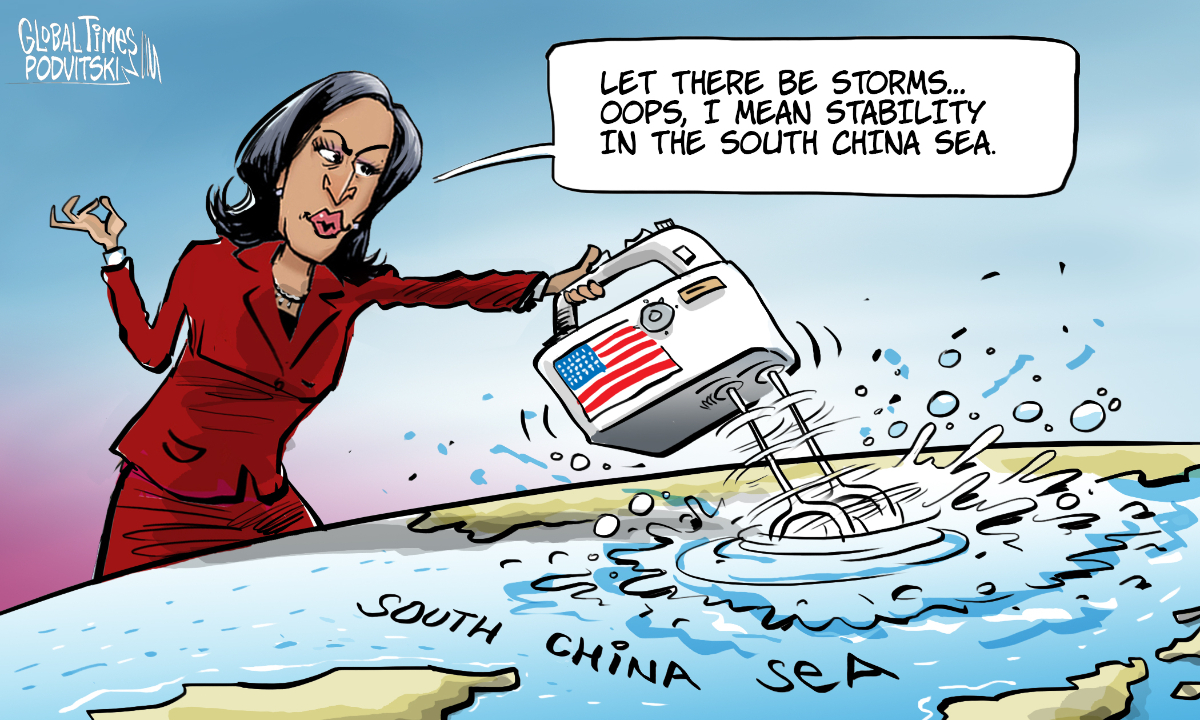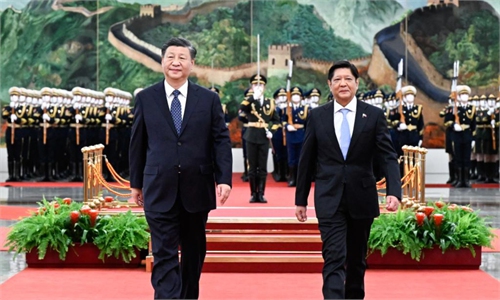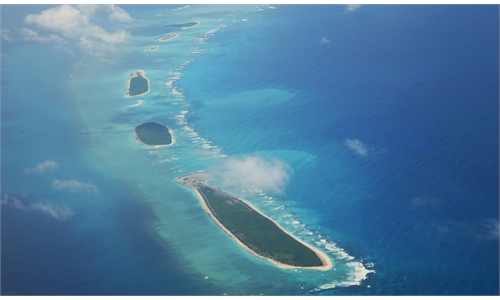New rounds of COC negotiations to start in March, indicating stable situation in South China Sea
US keeps interfering in regional issues, but 'will not affect overall peace, stability'

Harris eyes to stir up trouble in South China Sea with Philippines visit. Cartoon: Vitaly Podvitski
Chinese experts warned of US' interference in issues related to the South China Sea as part of the country's attempts to raise its influence in the region, as Indonesia said it plans to hold new rounds of negotiations over a code of conduct (COC) for disputed waters in the South China Sea.
Despite some recent setbacks, experts reiterated that individual incidents will not affect the overall peaceful and stable regional situation in the sea.
Indonesia, the Association of Southeast Asian Nations (ASEAN)'s chair for 2023, will hold new rounds of negotiations with ASEAN member states and China from March, as both sides have been trying for years to hammer out a COC to govern the disputed South China Sea.
During the close of a meeting between foreign ministers from ASEAN member states in Jakarta on Saturday, Indonesia's Foreign Minister Retno Marsudi said that Indonesia plans to intensify talks with China and other Southeast Asian countries to finalize a COC.
"New approaches" will be explored by all ASEAN member states and Chinese counterparts to make progress on the COC, Sidharto R. Suryodipuro, director of ASEAN cooperation at Indonesia's foreign ministry, said on the sidelines of the event.
China and ASEAN approved the framework for the COC for the South China Sea in 2017 out of the need to implement the Declaration on the Conduct of Parties (DOC) in the South China Sea. The two sides later arrived at the single draft negotiating text later in 2018. The code is expected to act as a preventive diplomatic measure and crisis management mechanism for South China Sea-related issues.
Due to the COVID-19 pandemic, negotiations have stalled for years.
The new rounds of negotiations have drawn attention as experts take them as a continuation of a stable and positive trend that indicates an overall peaceful and stable situation in the South China Sea. However, some others worry they may be affected by some recent setbacks between China and ASEAN member states.
Last week, the US managed to expand access to four additional military bases in the Philippines to boost its military flexibility in possible war scenarios with China. In early January, Indonesia deployed a warship to its North Natuna Sea to monitor a Chinese coast guard vessel, claiming that it had been in Indonesia's exclusive economic zone for some time.
The situation in the South China Sea is mainly affected by two main factors - US interference and some related countries' priority of their own interests over regional consensus, Wang Xiaopeng, an expert in maritime and border studies at the Chinese Academy of Social Sciences, told the Global Times on Sunday.
The regional situation and negotiations concerning the COC remain stable, but the US is trying to drive a wedge between China and regional countries. For example, the Philippines in the latest case, so China should be prepared, Wang warned.
Inked in 2002, the DOC is widely viewed as the first major political document on the South China Sea issue between China and the ASEAN members. In accordance with the spirit of the DOC, disputes in the South China Sea should be resolved through friendly consultation and negotiation between the countries concerned with the South China Sea, while peace and stability in the region should be jointly maintained by China and ASEAN members.
Article 10 of the DOC reads that "the Parties concerned reaffirm that the adoption of a code of conduct in the South China Sea would further promote peace and stability in the region and agree to work, on the basis of consensus, towards the eventual attainment of this objective."
This means "adoption" of a code of conduct is the ultimate goal. If negotiations on the code are left unfinished, the DOC cannot be carried out and mutual trust between China and ASEAN members will be negatively impacted, which in turn means the South China Sea will once again become an arena of major power games, analysts explained.
When explaining why the DOC and the COC are inseparable, Hong Liang, director general of the Department of Boundary and Ocean Affairs of the Chinese Foreign Ministry, stressed during an interview with the Global Times at a symposium in July 2022 commemorating the 20th anniversary of the signing of the DOC that the DOC is the foundation of the COC, without which the latter would not be possible.
The formulation of the COC is clearly stipulated in the DOC. Therefore, the important principles and spirit contained in the DOC should be fully reflected in the formulation of the COC, Hong said.
Facing interference from countries outside the region, Hong stressed that if China and ASEAN members can stay focused and do things that are conducive to peace and stability in the South China Sea, any external interference will not be successful.



